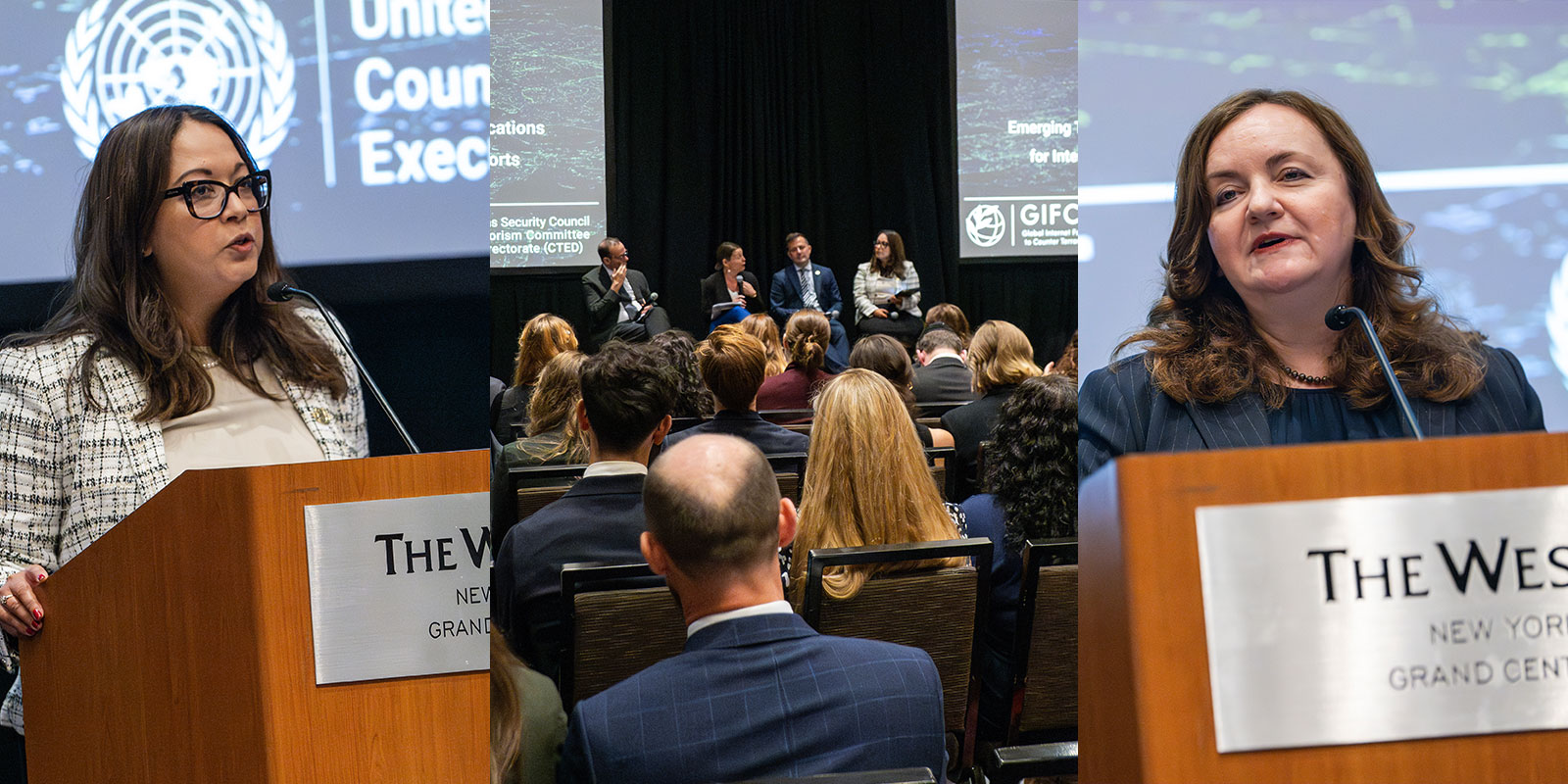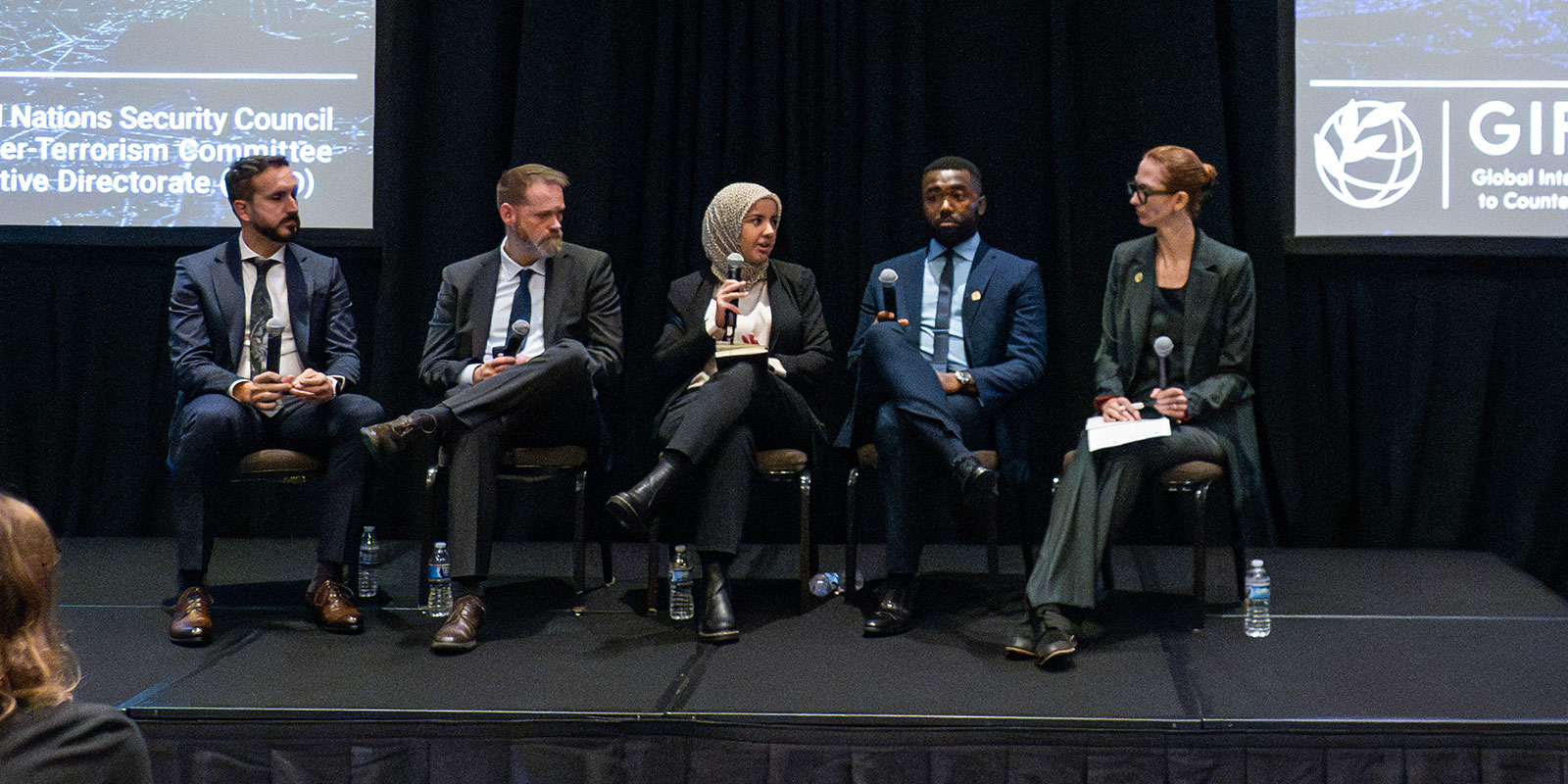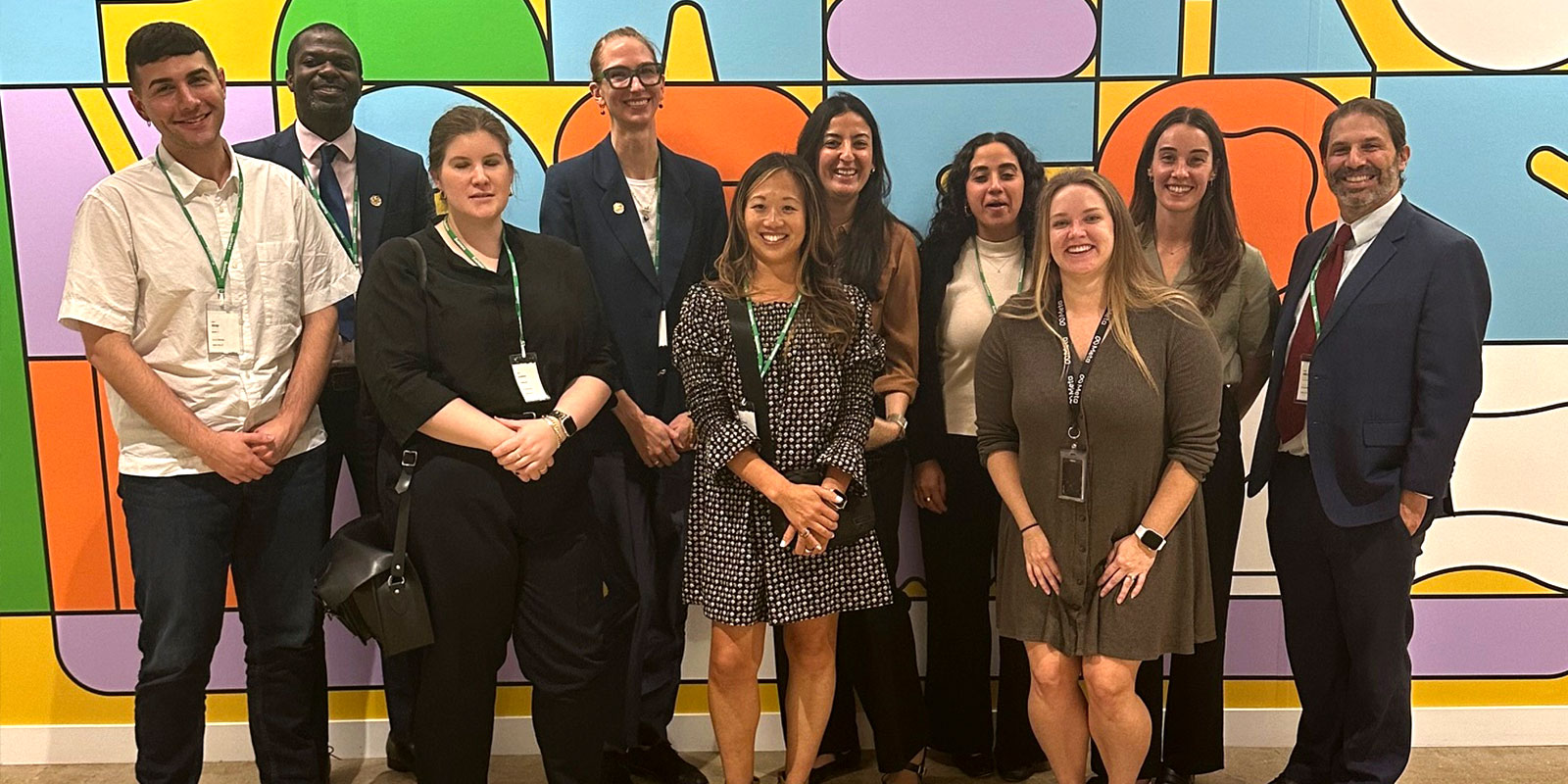September 26 & 27, 2024 / New York, USA
On the margins of the 79th United Nations General Assembly meetings (UNGA) on September 26 and 27, 2024, GIFCT convened three side events with key partners to highlight the state of play in counterterrorism efforts online and future opportunities for collaboration among stakeholders in industry, academia, and policy. This included events focussed on :
- Emerging Technologies and Implications for International Counterterrorism Efforts
- Intersections and Implications of Sanctions, Counterterrorism, and Tech
- Building Resilience: Collaborative Approach to Youth PVE Interventions Online
Emerging Technologies: Impacts & Implications for International Counterterrorism Efforts
On September 26th, GIFCT co-hosted an event with the United Nations Counter-Terrorism Committee Executive Directorate (UN CTED) convening over 100 key stakeholders including tech companies, governments, UN officials, civil society organizations, academics, practitioners, and policymakers. Opening remarks by GIFCT Executive Director, Naureen Chowdhury Fink, and Executive Director of the United Nations Counter-Terrorism Committee Executive Directorate, Natalia Gherman, highlighted the importance of multi-stakeholder approaches. For over two decades the UN, states, civil society and the private sector have collaborated to develop international laws, policies, and practices to counter terrorism. Opening remarks focused on the impacts and implications of emerging technologies, such as Generative AI, drones and hash sharing technologies as areas for collective efforts. The close relationship between global threats and conflict dynamics and online harms could not be understated, Ms. Fink noted. Both speakers reinforced that deepening understanding of national and regional contexts and perspective, human rights implications, and strengthening partnerships was key.
Fireside Chat: Emerging Technologies and Implications for Counterterrorism Policy and Practice
The “fireside chat” brought together Courtney Gregoire (Vice President & Chief Digital Safety Officer, Microsoft), David Scharia (Director and Chief of Branch, CTED), and Steven Hill (Executive Secretary, The International Institute for Justice and the Rule of Law), with Naureen Chowdhury Fink as moderator, to reflect on the evolution of emerging technologies, their implications for online and offline threats, and implications for existing counterterrorism frameworks, practices, and laws that have been developed by the international community. Speakers highlighted that, in the absence of specific legislation pertaining to emerging technologies like artificial technologies, drones, or 3D-printing, existing laws and regulations may be creatively applied. However, where adaptations or new legal frameworks may be necessary, there needs to be consideration to ensure they are pragmatic and can be meaningfully applied. Panelists reaffirmed the importance of multi-stakeholder engagement and the necessity to provide spaces for knowledge exchange and capacity development, and ensure they facilitated constructive discussions particularly among those with diverse perspectives. Such discussions and events fostered creative answers and connections to shape responses to adversarial shifts and evolving global threats, speakers noted.

Expert Dialogue on Drones, AI, and Hashing Technologies
The expert practitioner panel welcomed a dialogue on drones, artificial intelligence and hashing technologies. Erin Saltman (Director of Membership & Programs, GIFCT) spoke with Michael Jensen (Research Director, National Consortium for the Study of Terrorism and Responses to Terrorism), Shahed Warreth (Business Program Manager for AI Safety, Microsoft AI), Francis Okpaleke (Research Fellow, University of Waikato) and David Wells (Non-Resident Scholar, Middle East Institute) about the ways these technologies may be, or have been, exploited by terrorists and violent extremists. Panelists discussed the ways in which these technologies have impacted international counterterrorism efforts and gave preliminary suggestions for responses. Practitioners also highlighted that AI tools and hashing technology were tried and tested in assisting in scaled and cross-platform counterterrorism efforts online and should continue to evolve to meet the evolving threat, while also being cognizant of ethical frameworks, human oversight, and human rights concerns.

UN CTED’s Global Research Network on the Intersections Between Technology, Terrorism, and Counter-Terrorism
A second expert panel, organized by CTED’s Global Research Network and moderated by Racheal Atley (Coordinator of Political Analysis & Research, UN CTED), explored perspectives on how emerging technologies shape both terrorist and counter-terrorist strategies. Skip Gilmour (Director of Technology Policy and Solutions, GIFCT) noted that it was critical for researchers and experts to feed into the solutions being developed by technology companies. It helps the sector to better understand the threat and more effectively contribute to things like GIFCT’s incident response framework, he added. Michael Collins (Executive Director Americas, Institute for Economics & Peace) and Emma Allen (Program Manager, Research & Analysis, Hedayah) highlighted current and future tech-enabled threats reiterating concerns about AI generated content fueling the misinformation nexus with violent extremist groups looking to recruit and radicalize audiences. Panelists also highlighted innovative approaches safeguarding online spaces, including prevention and intervention strategies online that have evolved in the last ten years to look more holistically at online communities.
Intersections and Implications of Sanctions
GIFCT and Meta co-hosted a closed-door expert roundtable exploring the intersections and implications of sanctions, counterterrorism, and tech policies and practices. The discussions were anchored in GIFCT’s use of UN counterterrorism sanctions – reflected in the Consolidated List associated with UN Security Council Resolution 1267) – as a key reference for frameworks for cross-industry information sharing. Industry, government, and expert representatives reflected on lessons learned from the sanctions regimes and their policy goals, as well as lessons learned and concerns regarding impacts on human rights and implementation capacities. One of the key values of the “1267 List,” experts noted, was the foundation of global consensus around the measures and the designations adopted by the Security Council. However, non-profit organizations continue to be impacted by counterterrorism policies associated with FATF, one speaker highlighted, reiterating the importance of caution in setting out legislation and policies, urging attention to the unintended impacts.
For tech companies, understanding the context of the sanctions and the dynamics of listing and delisting was important, but also raised questions about the granularity of the list and how that might be taken into consideration by a range of companies, particularly ones that don’t maintain their own listings, experts noted. The event illustrated the importance of bringing cross-disciplinary perspectives together and considering the different instruments in the toolkit for defining and addressing terrorism and violent extremism, including its online and offline dimensions.
Building Resilience: Collaborative Approach to Youth PVE Interventions Online
GIFCT and Meta co-hosted a final closed-door practitioner roundtable with in-person and virtual participants to discuss the state-of-play of online Preventing Violent Extremism (PVE) efforts focused on resilience among younger online users. Intervention work has matured significantly over the past 10 years with a myriad of innovative research studies and pilot launches. However, as the threat of terrorist and violent extremist radicalization has become increasingly complex and decentralized across multiple tech platforms, there is a need to reassess approaches and partnerships to effectively deploy successful interventions.

The meeting convened a group of key tech platforms and practitioners working on this topic to discuss trends, and identify the needs of platforms and activists to advance youth prevention and engagement work online. Case studies and lessons learned were highlighted by the Extremism and Gaming Research Network, Violence Prevention Network, the Global Network on Extremism and Technology, and Search for Common Ground. The dialogue recognized the need for a continued cross-sector collaborative space to further expand intervention models and youth resilience work online. Meta highlighted innovative new approaches to strategic intervention work with at-risk audiences while Google highlighted advanced methodologies piloted by Jigsaw, advancing the Redirect Method. Based on the group’s feedback, this topic will be brought into scope in GIFCT’s 2025 Working Groups.
GIFCT Participation in Wider UNGA Side Events
Each year, the UN General Assembly meetings provide a unique opportunity for global partners to gather, brief one another on progress, and plan future partnership opportunities. GIFCT was delighted to attend and participate in side events relevant to our mission of preventing terrorists and violent extremists from exploiting digital platforms. GIFCT was honored to participate in convenings by the International Institute for Justice and the Rule of Law (IIJ) and attend events hosted by Google, the Global Counter Terrorism Forum (GCTF), the Global Engagement Center, Hedayah, Strong Cities, and the Global Center on Cooperative Security.




